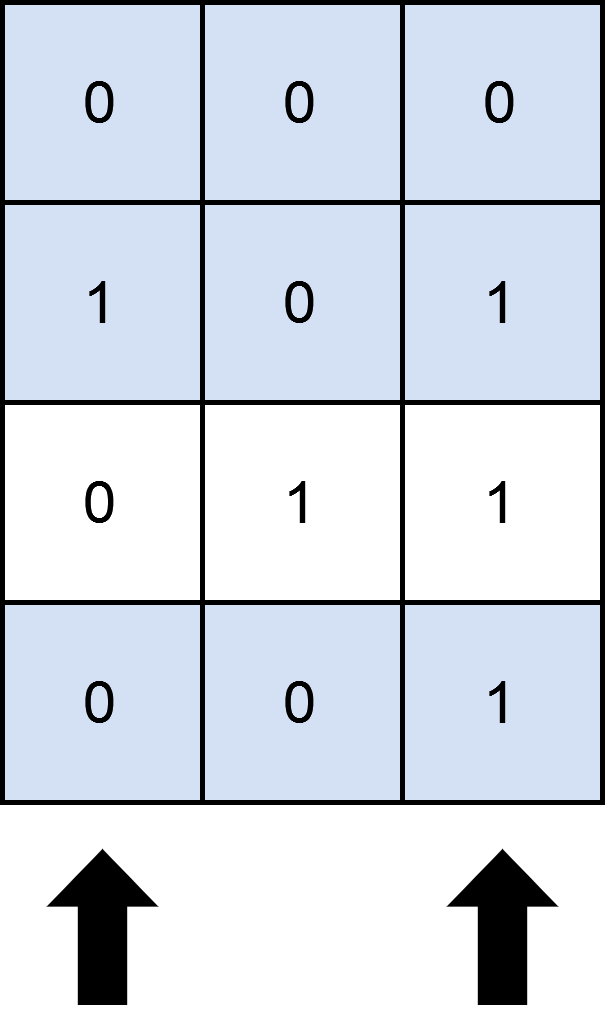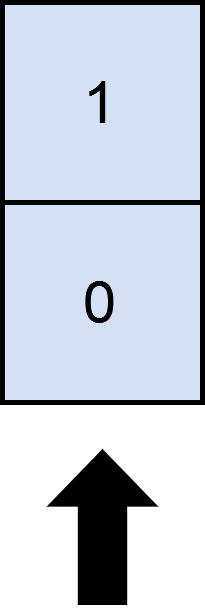LeetCode in Kotlin
2397. Maximum Rows Covered by Columns
Medium
You are given a 0-indexed m x n binary matrix matrix and an integer numSelect, which denotes the number of distinct columns you must select from matrix.
Let us consider s = {c1, c2, ...., cnumSelect} as the set of columns selected by you. A row row is covered by s if:
- For each cell
matrix[row][col](0 <= col <= n - 1) wherematrix[row][col] == 1,colis present insor, - No cell in
rowhas a value of1.
You need to choose numSelect columns such that the number of rows that are covered is maximized.
Return the maximum number of rows that can be covered by a set of numSelect columns.
Example 1:

Input: matrix = [[0,0,0],[1,0,1],[0,1,1],[0,0,1]], numSelect = 2
Output: 3
Explanation: One possible way to cover 3 rows is shown in the diagram above.
We choose s = {0, 2}.
-
Row 0 is covered because it has no occurrences of 1.
-
Row 1 is covered because the columns with value 1, i.e. 0 and 2 are present in s.
-
Row 2 is not covered because matrix[2][1] == 1 but 1 is not present in s.
-
Row 3 is covered because matrix[2][2] == 1 and 2 is present in s.
Thus, we can cover three rows.
Note that s = {1, 2} will also cover 3 rows, but it can be shown that no more than three rows can be covered.
Example 2:

Input: matrix = [[1],[0]], numSelect = 1
Output: 2
Explanation: Selecting the only column will result in both rows being covered since the entire matrix is selected.
Therefore, we return 2.
Constraints:
m == matrix.lengthn == matrix[i].length1 <= m, n <= 12matrix[i][j]is either0or1.1 <= numSelect <= n
Solution
class Solution {
private var ans = 0
fun maximumRows(matrix: Array<IntArray>, numSelect: Int): Int {
dfs(matrix, /*colIndex=*/0, numSelect, /*mask=*/0)
return ans
}
private fun dfs(matrix: Array<IntArray>, colIndex: Int, leftColsCount: Int, mask: Int) {
if (leftColsCount == 0) {
ans = Math.max(ans, getAllZerosRowCount(matrix, mask))
return
}
if (colIndex == matrix[0].size) {
return
}
// choose this column
dfs(matrix, colIndex + 1, leftColsCount - 1, mask or (1 shl colIndex))
// not choose this column
dfs(matrix, colIndex + 1, leftColsCount, mask)
}
private fun getAllZerosRowCount(matrix: Array<IntArray>, mask: Int): Int {
var count = 0
for (row in matrix) {
var isAllZeros = true
for (i in row.indices) {
if (row[i] == 1 && mask shr i and 1 == 0) {
isAllZeros = false
break
}
}
if (isAllZeros) {
++count
}
}
return count
}
}

